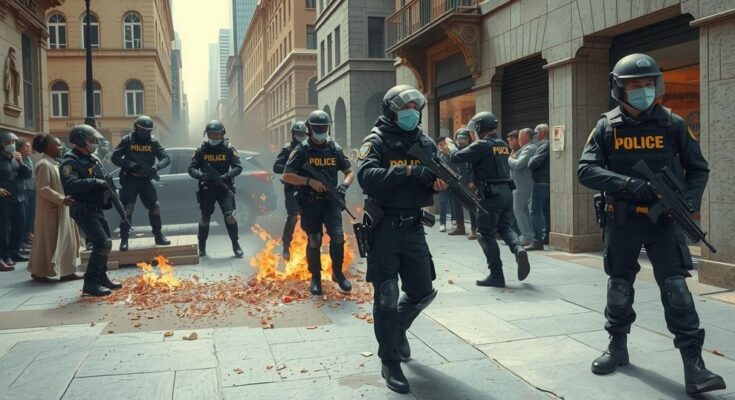The Mozambican police assert they use legitimate means to disperse protests, acknowledging potential injuries. They emphasize the need for public order to support access to essential services. The ongoing unrest has resulted in considerable casualties, highlighting frustration over election results and rising living costs.
The Mozambican police have clarified their approach to managing protests, stating they utilize “legitimate means” for dispersing demonstrators. They acknowledged the potential for injuries during such interventions, particularly when protests block essential routes for people and goods. Leonel Muchina, the head of the public relations department of the police general command (PRM), emphasized that following the exhaustion of appeals to protesters, actions may be necessary to prevent vandalism.
In a press conference held in Maputo, Mr. Muchina specified that the police employ crowd-dispersal methods, including the use of tear gas, which while effective, may inadvertently lead to injuries. He underscored the constitutional right to protest but stressed the importance of respecting other citizens’ fundamental rights, drawing attention to the impact of road blockages on access to critical social services like hospitals.
Furthermore, the police advised that participation in protests should not be coerced and argued that violent protests impede national development. Mozambique has been marked by social unrest since October, initiated by protests against disputed election results that favored Daniel Chapo over former presidential candidate Venâncio Mondlane. Although currently reduced in scale, these protests continue to highlight grievances concerning the rising cost of living and other societal issues.
According to the Decide monitoring platform, the unrest has resulted in at least 357 fatalities since October, which includes about two dozen minors. The government has reported at least 80 deaths and considerable damage, including the destruction of 1,677 businesses, 177 schools, and 23 health facilities during the protests.
In summary, the Mozambican police maintain they apply legitimate methods for dispersing protests, particularly to prevent disruptions to essential public services and roadways. While acknowledging the constitutional right to protest, officials advocate for respect toward the rights of others. The ongoing protests, stemming from contested election results and rising living costs, have contributed to a significant number of casualties and infrastructural damage. The situation underscores the ongoing social unrest in Mozambique and the complexity of addressing citizens’ grievances.
Original Source: clubofmozambique.com




